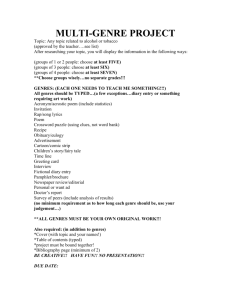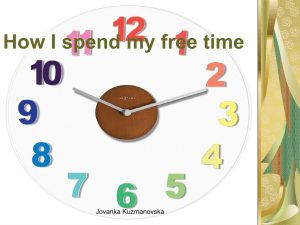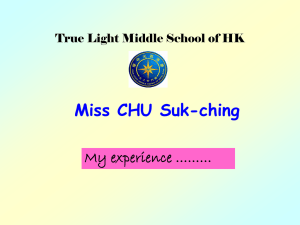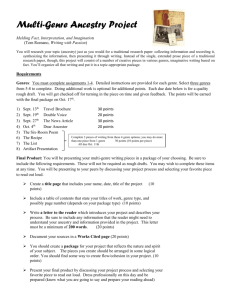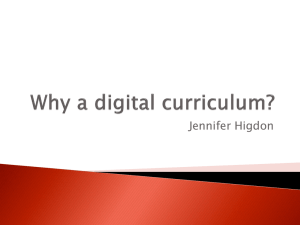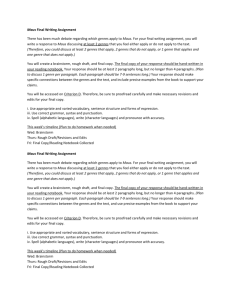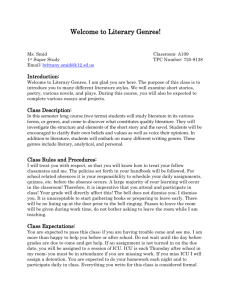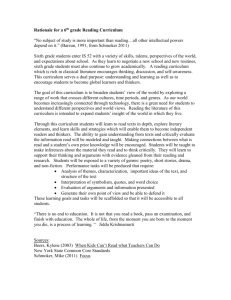SBPart1 - Reiff Advertising & Design, Lawrence KS
advertisement
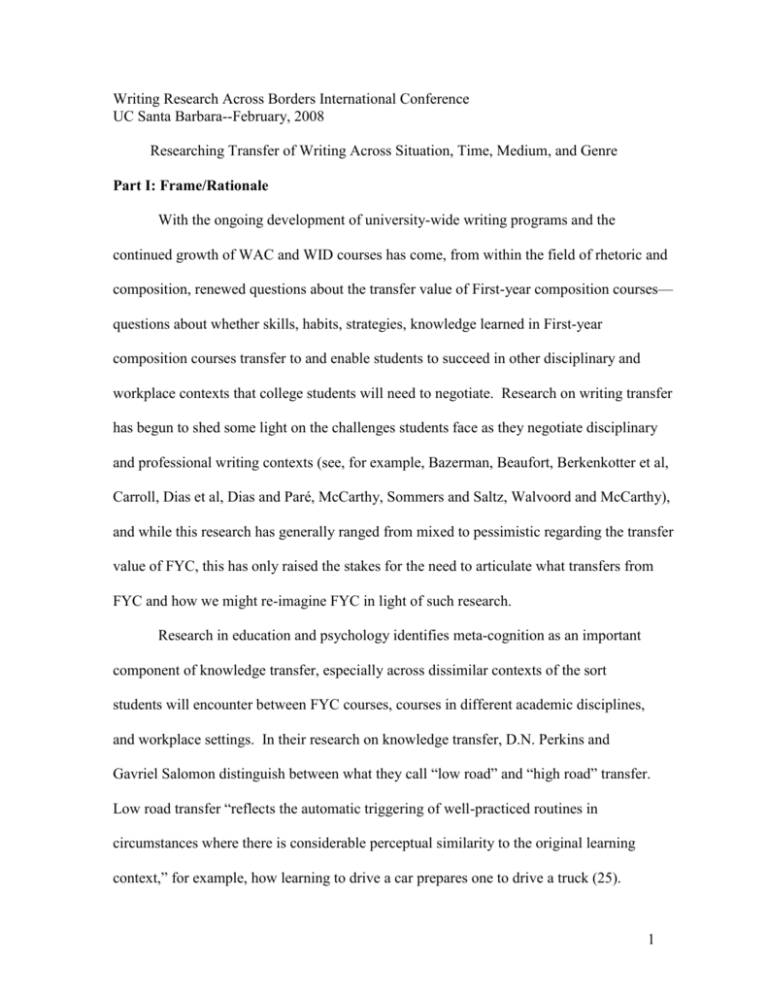
Writing Research Across Borders International Conference UC Santa Barbara--February, 2008 Researching Transfer of Writing Across Situation, Time, Medium, and Genre Part I: Frame/Rationale With the ongoing development of university-wide writing programs and the continued growth of WAC and WID courses has come, from within the field of rhetoric and composition, renewed questions about the transfer value of First-year composition courses— questions about whether skills, habits, strategies, knowledge learned in First-year composition courses transfer to and enable students to succeed in other disciplinary and workplace contexts that college students will need to negotiate. Research on writing transfer has begun to shed some light on the challenges students face as they negotiate disciplinary and professional writing contexts (see, for example, Bazerman, Beaufort, Berkenkotter et al, Carroll, Dias et al, Dias and Paré, McCarthy, Sommers and Saltz, Walvoord and McCarthy), and while this research has generally ranged from mixed to pessimistic regarding the transfer value of FYC, this has only raised the stakes for the need to articulate what transfers from FYC and how we might re-imagine FYC in light of such research. Research in education and psychology identifies meta-cognition as an important component of knowledge transfer, especially across dissimilar contexts of the sort students will encounter between FYC courses, courses in different academic disciplines, and workplace settings. In their research on knowledge transfer, D.N. Perkins and Gavriel Salomon distinguish between what they call “low road” and “high road” transfer. Low road transfer “reflects the automatic triggering of well-practiced routines in circumstances where there is considerable perceptual similarity to the original learning context,” for example, how learning to drive a car prepares one to drive a truck (25). 1 High road transfer, on the other hand, “depends on deliberate, mindful abstraction of skill or knowledge from one context for application to another” (25). Because knowledge and skills do not automatically transfer across dissimilar contexts, high road transfer requires “reflective thought in abstracting from one context and seeking connections with others” (26). The ability to seek and reflect on connections between contexts, to abstract from skills and knowledge, to know what prior resources to draw on and what new resources to seek are all examples of meta-cognitive processes needed for high road transfer. In his book The End of Composition Studies, David Smit identifies “transferability” as a primary consideration for writing instruction, concentrating on related factors of instructional focus (what is taught), genre (what students write), and context (the numerous situations in which students write). But how does one study a process that is so context variable and meta-cognitive? This roundtable brings together co-researchers from four studies on transfer undertaken recently at two different public research universities. The studies include a cross-institutional inquiry into college students’ transfer of prior genre knowledge into FYC; a two-year investigation into FYC students’ transfer of rhetorical knowledge across academic writing situations and media; and a survey-based study of how students perceive the transferability of FYC research skills. In a structured, two-part conversation, we will first present from each study’s research findings, and then reflect on each study’s research practices, addressing in particular questions about effective study design, methodology, and logistics. Our goal is not just to share findings, but also to open up discussion about research design possibilities and challenges for studying a process as complex as writing transfer. 2 Part I: Research Questions and Findings As Perkins and Solomon suggest, the ability to seek and reflect on connections between contexts, to abstract from skills and knowledge, to know what prior resources to draw on, how to use these resources flexibly, and what new resources to seek are all preconditions for effective writing transfer across different contexts. [Slide 1] To what extent do students bring these meta-cognitive habits and strategies with them to FYW courses? In what follows, I will briefly report findings from a cross-institutional (UT and UW) research study that examines how FYC students transfer prior genre knowledge into new contexts and tasks. [Note about members of research team and Sunday presentation] The study’s goals were to determine what types of resources, especially prior genre knowledge, student writers bring to college and how students draw on these resources in the process of negotiating between and participating in new academic writing contexts. Our research questions were as follows: [Slide 2] What genres (written, oral, digital) do students already know when they arrive in FYC courses? How do students use their prior genre knowledge when writing new genres for FYC courses? What factors contribute to how and why students transform prior genre knowledge into new genre knowledge? To what extent does this prior knowledge help or hinder students’ ability to gain access to academic discourse? To answer these larger questions, we formulated a series of sub-questions, which we used to analyze our two data sets: student responses to a survey and transcripts of discourse-based interviews, both of which Mary Jo will describe in Part 2. [Slide 3] From the surveys, we wanted to know what genre knowledge and experience students brought with them, and what attitudes they held about these genres: what domains they wrote them in, which they most and least enjoy, 3 have had most/least success with, and which ones they predict will be most helpful to them in FYC. From the interviews, [Slide 4] we wanted to know how students applied this knowledge in their FYC course: both in a first-week-of-class assignment and then a major paper mid-way through the course. Specifically, we wanted to know what genres they were reminded of and drew on for each. [Slide 5] To answer these questions at this point, we have analyzed 52 surveys and 9 interviews from UT and 64 surveys and 18 interviews from UW. Today we will report on all but the 9 UT interviews. In our survey, students were prompted to select all the types of writing they had done before coming to UT or UW, and to indicate if they had done them for school, for work, and/or outside of school and work. The findings give us insight into the diverse kinds of genres students wrote and the places where students most often used these genres. [Slides 6 and 7] indicate the genres students wrote most frequently. Looking at [Slide 7], for example, reveals the wide range of genres students report having written. Even genres written by the least number of students—on-line discussion board, newspaper article, blog or on-line journal, song lyrics, letter to the editor, web page text, and web page design—represent between a quarter to nearly one-half of the respondents. Although most often students reported having written genres in school-based contexts, in both UT and UW surveys we see a good number of students who wrote select genres in contexts outside of both school and work [Slide 8]. This indicates that students have an expansive field of antecedent genre knowledge and that the writing of these genres takes place in different domains. The following chart [Slide 9] has refigured the information shown earlier in order to highlight how often genres overlap in either two or three domains (school, work, 4 other). Although most students did not typically write genres in more than one domain (school, work, or other), some students did write the same genre in at least two domains (school and work, for example), with a smaller percentage writing the same genre in three separate domains (school, work, and other). Genres did not generally traverse domains, but for a few exceptions: e-mail, personal letter, text messaging, business letter, personal narrative, power point presentation, instant messaging, freewriting, and on-line discussion board contributions. Even in these cases, however, domain overlap was limited. This data suggests that students have a wealth of genre knowledge; They wrote in all three of the domains we supplied—school, work, and outside of school and work— although they wrote most extensively in school and outside of school and work; and their writing did not tend to cross domains, except for a select few genres. In terms of what students reported as the genres they most and least enjoyed and had most and least success with, these also exhibit a wide range. [Slide 10] lists the genres student most and least enjoyed. Both UT and UW students indicate they enjoy creative writing, personal writing, freewriting, and research the most (we have data on their reasons why which we will post on our research blog). However, an almost equal number of students list creative writing and research writing as the genres they least enjoy. [Slide 11] shows a similar pattern. Both UT and UW students list research papers, analysis papers, and creative writing as among the kinds of writing they have experienced most success with. Yet again, an almost equal number of students indicate experiencing least success in these genres. Such variability makes it very difficult for us to generalize, beyond a case by case basis, if students, when facing a new writing task, will draw on genres they most or least enjoy, have had most or least success with. Our 5 preliminary observation at this point is that when facing a new writing task, students don’t automatically turn to genres they most enjoy or have had most success with, but rather turn to genres and experiences they anticipate will be most appropriate for the task. [Slide 12] Indeed, when asked what high school writing experiences they thought would help them succeed in FYC, both UT and UW students mentioned most their experiences with writing different genres. The 38 total genres named ranged across what student had identified as least and most enjoying, or had least or most success with. Results from the discourse-based interviews with our UW study participants reveal that students, despite the fact that they have a wealth of genre knowledge and have written in a number of different domains, tended not to draw on the full range of their experiences and resources when confronted with a new writing task in college. In our interviews, we asked students about an ungraded preliminary essay (about the UW common book) they wrote at the very beginning of their FYC course. 14 of the 18 students we interviewed completed the preliminary essay and were asked what genres the prompt reminded them of, and what types of writing they had drawn on in writing the essay. [Slide 13] Students reported that the assignment prompt mainly reminded them of writing that occurs in a school-based domain. Given the context in which the essay prompt was provided and the academic trigger words contained in the prompt such as “essay,” “analyze,” and “research,” it is not surprising that students were reminded of school-based genres. But the fact that students also reported mainly academic-only genres when asked what genres they drew on to answer the essay prompt suggests that students assume such a strong link between particular genres and specific domains that they may not call on potentially useful genre experiences that they associate with other 6 domains which could have been equally if not more useful in completing the assignment. During our coding and analysis of the interviews, two interesting patterns emerged: the relationship between genres and strategies, and the move from genres to what we termed “not” genres. When we asked students what genres they were reminded of or drew on, they would often name genres such a five-paragraph essay, book review, literary analysis. But they would also name what we began identifying and coding as “strategies.” [Slide 14] gives some examples. The top three examples (in red) identify genres while the bottom three (in blue) identify strategies: using a road map, coming up with a stance and defending it, using a quote and then two sentence analysis. [Slide 15] shows the relation between genres and strategies. For the first-week preliminary essay and mid-term Major paper, students reported being reminded of about the same number of genres, with between nearly a half and a third of students reporting no reminded strategies. Yet when it came to genres and strategies used, there is a dramatic increase between the preliminary essay and major paper, with students using about three times as many genres and about four times as many strategies. The increase in genres used is very likely due to the nature of the major paper assignments, which tend to be complex and require sequenced and multi-scaffolded tasks. But the increase in genres used can also suggest that students, when facing more complex tasks, draw on a wider range of prior genres than they even can report being reminded of. At the same time, the increase in strategies used suggests that when students use prior genre knowledge, they don’t do so only in terms of whole genres, but more often in terms of rhetorical strategies and processes abstracted from a range of prior genres. 7 If the process of genre transfer involves the abstraction and then use of component genre parts as strategies, the identification of “not” genres seems to play a significant role. In analyzing our interviews, we noticed and began coding for what some students would refer to as “not genres” when asked what they were reminded of and used. [Slide 16] provides some examples of “not five-paragraph essay” and “not literary analysis.” The other two examples describe how the recognition of “not” genres allows students to abstract strategies from prior genres into less familiar genres: Uhm, well the prompt was kind of on the lines of, if you were writing a review about a chosen topic, and I chose uhm, the man in my basement by I think Mosley, Walter Mosley. So I wrote it kind of in a new format so not particularly essay, but I put in like the kind of review aspect for like, this author wrote these books before, you know, like kind of giving a background of the author, but more then I would in an essay. Half of the students interviewed reported at least one “not” genre reminded of for the preliminary essay and major paper (not the same students) [Slide 17]. Also, 5/18 students reported not-genres when asked what genres they used to write the major paper. We still need to do more case study research to examine this, but one hypothesis is that the increase in not-genres in response to genres used for the major paper could account for the increase in strategies used for the major paper. And while we have to acknowledge that we are dealing only with reported cognitive processes, and we don’t yet know if the identification of not-genres correlates to more success, the presence of not-genres might provide insight into transfer of writing, especially why and how some students modify prior genre knowledge while others hold on to prior genres to such an extent that they reformulate their assignment in ways that make it possible for them to draw on prior genres rather than acknowledge not-genres. 8 Bibliography Bazerman, Charles. “What Written Knowledge Does: Three Examples of Academic Discourse.´ Philosophy of the Social Sciences 2 (1981): 361-87. Beaufort, Anne. College Writing and Beyond: A New Framework for University Writing Instruction. Logan: Utah State UP, 2007. ---. Writing in the Real World: Making the Transition from School to Work. New York, Teachers College Press, 1999. Berkenkotter, Carol, Thomas Huckin, and John Ackerman. “Conventions, Conversations, and the Writer: Case Study of a Student in a Rhetoric Ph.D. Program.” Research in the Teaching of English 22 (1988): 9-44. Carroll Lee Ann. Rehearsing New Roles: How College Students Develop as Writers Carbondale: Southern Illinois UP, 2002. Dias, Patrick, and Anthony Paré, eds. Transitions: Writing in Academic and Workplace Settings. Cresskill: Hampton Press, 2000. ---, et al. World’s Apart: Acting and Writing in Academic and Workplace Contexts. Mahwah: Lawrence Erlbaum Associates, 1999. McCarthy, , Lucille. “A Stranger in a Strange Land: A College Student Writing Across the Curriculum.” Research in the Teaching of English 21.3 (1987): 233-65. McDonald, Catherine. The Question of Transferability: What Students Take Away from Writing Instruction. Diss. University of Washington, 2006. Perkins, D.N., and Gavriel Salomon. “Teaching for Transfer.” Educational Leadership 46.1 (1988): 22-32. Russell, David. “Activity Theory and Its Implications for Writing Instruction.” Reconceiving Writing, Rethinking Writing Instruction. Ed. Joseph Petraglia. Mahwah: Lawrence Erlbaum, 1995. 51-78. Smit, David. The End of Composition Studies. Carbondale: SIUP, 2004. Sommers, Nancy, and Laura Saltz. “The Novice as Expert: Writing the Freshman Year.” College Composition and Communication 65.1 (2004): 124-49. Walvoord, Barbara, and Lucille McCarthy. Thinking and Writing in College: A Natrtalisitc Study of Students in Four Disciplines. Urbana: NCTE, 1990. 9
